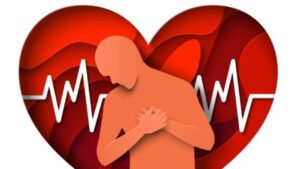News Desk, Kolkata : Many women occasionally experience breast pain, commonly known as mastalgia. While some attribute it to hormonal changes during menstruation, breast pain can occur at other times as well.
According to medical professionals, breast pain can have various causes, not limited to hormonal fluctuations. Conditions such as cysts, fibrocystic changes, or strain on the chest muscles can contribute to breast pain. Therefore, dismissing breast pain as solely related to hormonal changes may not be prudent.

One significant cause of breast pain is cysts. In such cases, the intensity of the pain may vary over time, and the presence of lumps can be felt. Hormonal changes during menstruation can exacerbate breast pain, making it more pronounced. Hence, seeking medical advice is essential if breast pain occurs regularly.
During the menstrual period, there is an increase in estrogen and progesterone hormones, leading to changes in breast tissue and potential discomfort. Additionally, sensations like swelling, tenderness, and heightened sensitivity may be felt in the breasts during this time.
Striking a balance between rest and physical activity is crucial, especially when the chest area has been subjected to trauma or strain. Feeling discomfort in breast tissue is common, and adequate rest often alleviates the pain. However, if the pain persists for several days, consulting a healthcare professional is recommended.
Breast pain can also arise from breastfeeding. As the breasts become engorged with milk, there can be a feeling of fullness and discomfort. Proper positioning of the baby during breastfeeding is crucial to prevent any strain on the breast tissue. Seeking guidance from a lactation consultant or a specialist in women’s health can be beneficial in addressing breastfeeding-related breast pain.
In some cases, medications, including contraceptive pills, can trigger breast pain as a side effect. Monitoring changes in breast health alongside gradual weight loss, persistent coughing, or a family history of cancer is crucial. If these symptoms coincide with breast pain, immediate consultation with a healthcare professional is advised.
It’s essential to understand that breast pain should not be disregarded as a mere inconvenience. Regular breast self-examinations, along with seeking medical advice for persistent or unusual symptoms, play a crucial role in women’s health. Breast pain, when addressed promptly, can often be managed effectively.
In conclusion, breast pain is a multifaceted issue with various potential causes. While hormonal changes during the menstrual period can contribute to discomfort, other factors such as cysts, fibrocystic changes, muscle strain, and medication side effects should also be considered. Regular self-examinations, maintaining a healthy lifestyle, and seeking medical advice when needed are essential steps in ensuring breast health.
DISCLAIMER
Our news media denounces any form of bias and disapproves of sensationalism. The disseminated news is entirely educational and aimed at social awareness. Our media maintains absolute impartiality, adhering solely to the purpose of education and social consciousness.